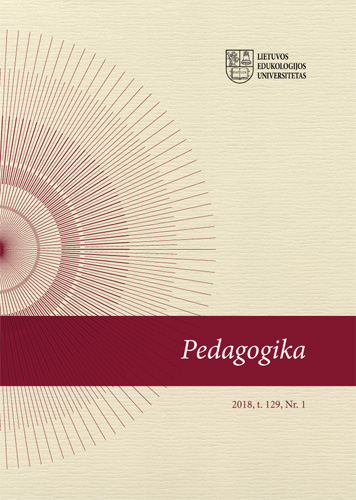Pirmo kurso būsimųjų sporto pedagogų akademinė motyvacija ir pasitenkinimas
studijomis
First-Year Pre-Service Physical Education Teachers’ Academic Motivation and Their Satisfaction with Academic Studies
Author(s): Sniegina PoteliūnienėSubject(s): Education, Higher Education , Educational Psychology, Evaluation research, Sports Studies
Published by: Vytauto Didžiojo Universitetas
Keywords: pre-service physical education teachers; academic motivation; satisfaction with academic studies; self-determination theory;
Summary/Abstract: It is important to analyse the motives that encourage students to choose academic studies as this points out to how engaged with their field of studies and how well prepared for their future profession they will be. The learning experience of university students, their satisfaction or dissatisfaction with academic studies can encourage students either to become more strongly committed to their profession or to revise their career goals. The aim of the present research was to determine the academic motivation of the first year pre-service physical education teachers and how this relates to their satisfaction with academic studies. In order to assess the students’ intrinsic, extrinsic motivation and a motivation the Academic Motivation Scale (AMS) (Vallerand et al., 1992) was used. The Course Experience Questionnaire (Ramsden, 1991), which consists of 5 sub-scales: Good teaching, Clarity of goals and standards, Appropriate workload, Appropriate assessment, Development of generic skills, was used in order to determine the students’ satisfaction with their studies. There were surveyed 84 first year full-time students of physical education study programmes in the field of education and development from the four Lithuanian universities. It was established that, while choosing a career and getting ready for the professional activity, for pre-service physical education teachers both intrinsic and extrinsic motives are common and the level of a motivation is low. The highest score was given by the first year students for the teaching strategies that motivate students to learn (Good teaching). The lowest scores in the student satisfaction with academic studies were recorded in their evaluation of Appropriate Workload and Appropriate Assessment. The research revealed that both intrinsic and extrinsic academic motivation of students have a statistically reliable connection of mean strength with Quality of teaching, Clarity of goals and standards, as well as Development of generic skills, whereas a motivation – with Appropriate workload and Appropriate Assessment sub-scales. The results of the present quantitative research are significant in assessing the impact of academic environment on the students’ motivation to pursue the chosen profession.
Journal: Pedagogika
- Issue Year: 129/2018
- Issue No: 1
- Page Range: 234-249
- Page Count: 16
- Language: Lithuanian

